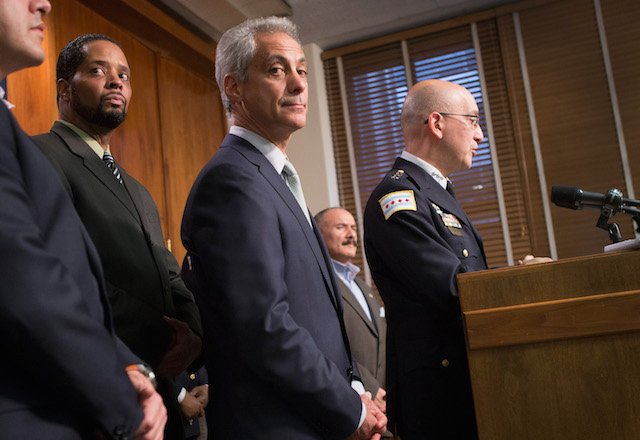Troubling Emails Show Rahm's Office Knew They Had A Big Problem With Laquan Video
By aaroncynic in News on Jan 4, 2016 7:40PM

Chicago Mayor Rahm Emanuel listens as Interim Chicago Police Superintendent John Escalante addresses changes in training and procedures. (Photo by Scott Olson/Getty Images)
The Mayor's Office formally wished the city of Chicago a happy new year with a ream of emails showing that Rahm Emanuel knew just how bad the release of the Laquan McDonald video could be, long before its release.
On New Year's Eve, Emanuel's office released over 3,000 pages of emails, some of them heavily redacted, that showed how they were scrambling to respond to the release of the video, as well as subsequent protests over McDonald’s death at the hands of police.
Despite Emanuel’s assertion he hadn’t seen the video before the election, emails show that top aides for the mayor knew details of the shooting back in December 2014, and communicated regularly with the Chicago Police Department and the Independent Police Review Authority. Then-IPRA head Scott Ando sent a message to Janey Rountree, deputy chief of staff for public safety, with a link to a statement from the Invisible Institute demanding the release of the video of the shooting. In the days following, emails show several mayoral aides communicating back and forth about a response to that piece, along with other inquiries from reporters, including Mary Mitchell from the Sun-Times.
“Should I defer her to IPRA as well, or provide some sort of statement?” wrote Deputy Director of Communications Adam Collins to the CPD Director of News Affairs, in reference to Mitchell’s inquiry regarding the statement from the Invisible Institute.
Documents also show lawyers for City Hall believed a lawsuit from the McDonald family was nearly certain. "I have again asked our lawyers to be on the lookout for a complaint in that matter and to notify us immediately if and when a complaint is filed,” wrote attorney Steve Patton to Emanuel’s staff. In a letter to the city’s law department when a settlement was first demanded by the McDonald family, attorneys wrote of how impactful the video would be:
“I submit the graphic dash cam video will have a powerful impact on any jury and the Chicago community as a whole. This case will undoubtedly bring a microscope of national attention to the shooting itself, as well as the City’s pattern, practice, and procedures in rubber stamping fatal police shootings of African Americans as ‘justified’.”
During the settlement discussions, city lawyers asked about McDonald’s past, writing:
“Was Laquan associated with any street gangs? Was Laquan’s family/supporting adults aware that (he) was charged with numerous narcotics offenses, battery, resisting, obstructing, reckless conduct, agg. Battery to a peace officer, assault, alcohol, to minor offenses?”
Shortly after the settlement agreement was reached, Collins crafted a statement for Ando. Collins said though, that the city was not involved with the IPRA investigation, telling the Sun-Times last week that “coordinating with City agencies on press statements is completely separate from IPRA’s independent investigative work.”
Communications directly to and from Emanuel, who is referred to as “MRE” or “REMOC,” were scant, with many just containing simple press briefings. In addition to keeping abreast of what media had been reporting about the McDonald case and other related stories involving the Chicago Police, the mayor’s staff along with CPD regularly communicated about the numerous protests Chicago has seen in the past months, often sending each other links to social media postings about them.
You can view the documents in seven separate PDF’s from Chicago Tonight. Additionally, Streetsblog Chicago’s Steve Vance coordinated a crowdsourced document annotating the emails here.